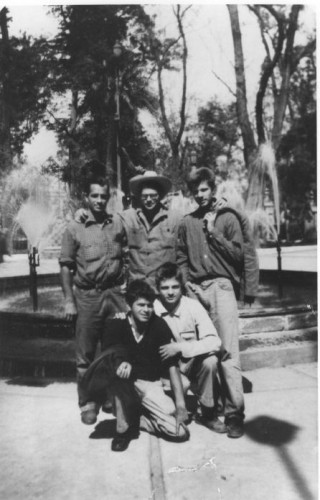Book Review: Jack Kerouac in Mexico — Fiction Dressed as Fact
Reading this book is like listening to a lively conversation from a self-proclaimed Kerouac authority giving his opinions over a café con leche late at night at Cafe Pamplona in Harvard Square.
At the End of the Road: Jack Kerouac in Mexico by Jorge Garcia-Robles. Translated from the Spanish by Daniel C Schechter. University of Minnesota Press, 152 pages, $17.95 trade paper.

By Paul Dervis
It is odd to read a piece of non-fiction that relies so heavily on works of fiction for its source material, but that is exactly Mexican novelist Jorge Garcia-Robles’s approach in his latest tome about the Beat writers who lived for a time in his homeland. At the End of the Road: Jack Kerouac in Mexico is a follow-up to his earlier work, The Stray Bullet: William S. Burroughs in Mexico. (Arts Fuse review)
He often writes about what fans already know of Kerouac; his complicated relationships with his mother, The Catholic Church, and countless women. He also spends time with the novelist’s friendships with Burroughs, Neal Cassady, and Cassady’s wife, Carolyn. Allen Ginsberg, who Kerouac had a close and long-term friendship with, plays a much smaller role in this short book. Kerouac’s wives play virtually no role at all.
Kerouac lived, at various short intervals, in Mexico City, often crashing at Burroughs’s flat. The author of Naked Lunch was holed up in Mexico evading a trial in Louisiana for drug possession. There Kerouac would immerse himself with drugs, alcohol, and prostitutes. He would also write much of his important work. By the mid 1950’s Kerouac had written several novels, most unpublished, but was still waiting for notoriety and, more significantly, cash to find him.
Garcia-Robles spends a great deal of time in his book describing the Mexico of the first half of the 20th Century through the writings of other expatriate novelists who spent time there, as well as Kerouac’s own musings on that country through his novels.
And therein lies the rub. Kerouac was admittedly an autobiographical novelist, but his work was still fiction. Yet Garcia-Robles quotes the author’s writing as if it provided facts. He uses Kerouac’s quotes and attributes them as verbatim reporting about events. What are we left to believe?
In this book, Kerouac is credited with such seminal moments as coining the phrase “Beats” as well as insisting that Burroughs title his manuscript Naked Lunch. Garcia-Robles touches on the writer’s brushes with homosexuality, and his pedestrian abilities in the bedroom. He also writes about Kerouac’s unsuccessful forays into the world of labor.

Jack Kerouac and friends in Mexico.
Much of what Garcia-Robles chronicles as significant moments in Kerouac’s life appear to be conjecture served up as fact: “At age nineteen Jack Kerouac walked down Broadway, crossed Forty-Seventh Street, looked up, glimpsed the neon of Times Square, observed the Camels ad, looked at a man clutching a briefcase and adjusting his glasses…for the first time he surmised that he was unlike others.” Where did Garcia-Robles get this? Was it from an interview Kerouac gave? Did Kerouac write it himself in some article? Who knows? It is uncredited, without a footnote or source. Given that Garcia-Robles most assuredly was not there, the reader needs to know that this actually happened and is not just some proposition the biographer is making up out of whole cloth.
That passage is only an example. This book is chock full of these stories.
Still, while the book is a fact checker’s nightmare, it is actually a pretty good read. Garcia-Robles, a novelist himself, knows how to craft a story. His writing is engaging, his characters are very much alive on the page. And his translator Daniel C. Schechter keeps the English version of the Spanish text moving forward smoothly. There are very few awkward sentences.
Reading this book is like listening to a lively conversation from a self-proclaimed Kerouac authority giving his opinions over a café con leche late at night at Cafe Pamplona in Harvard Square.
The volume, only 128 pages long, is a quick read. If you are an admirer of Kerouac’s writing, you will be pleased with At the End of the Road. If you are doing research on the seminal Beat writer, you will find the book virtually useless.
Paul Dervis has been teaching drama in Canada at Algonquin College as well as the theatre conservatory Ottawa School of Speech & Drama for the past 15 years. Previously he ran theatre companies in Boston, New York, and Montreal. He has directed over 150 stage productions, receiving two dozen awards for his work. Paul has also directed six films, the most recent being 2011’s The Righteous Tithe.
Tagged: End of the Road, Jack Kerouac, Jack Kerouac in Mexico, Jorge Garcia-Robles
